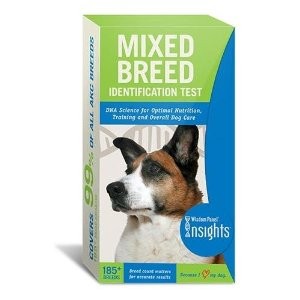The first DNA dog breed tests hit the market in 2007. Interest and curiosity were keen at the time. Soon, so was skepticism. There have been 7 years since, and veterinarians have been weighing in on reports from their clients’, friends’ and their own results. Some are more plausible, and some just make no sense at all. I will wade through the internet vet chatter, and see if I can be of some help, if you were on the fence about testing your own, mixed breed dog.
Some of the not so plausible stories:
– There was an 80 lb dog, whose mother was known to be a Labrador retriever, that tested as mostly miniature poodle, plus Yorkshire terrier.
-There was a pedigreed dachshund, who turned up as predominantly Siberian husky, with a bit of dachshund and Ibizan hound.
– There was a dog that looked like a classic Chihuahua, who came back as “an extremely complex mix, with distant traces of Afghan hound, Cavalier King Charles spaniel and toy fox terrier. And the list goes on…
A veterinary network did a test, where they submitted the DNA samples of 6 dogs with known background, to compare the results obtained. 5 types of DNA tests were utilized. The first 4 were variations of the Wisdom Panel, owned by Mars Veterinary, and the most well known. The fifth test was Canine Heritage by Scidera, LLC. The result, the Wisdom Panel was the superior test. Though not flawless, the test tended to give reasonable and usually consistent results, if not enlightening. Geneticists consulted thought the Wisdom Panel the most scientifically reputable.
The concept of determining a dog’s breed background by analyzing its DNA is grounded in science, using genetic markers. The markers used in testing for dog breeds are known as SNP’s, which are small mutations within the genome, which form “signatures” particular to each breed. It is, thus, not based on specific genes, and furthermore does not specifically relate to physical or behavioral traits that characterize breeds. For example, the technique used in the testing doesn’t recognize a bulldog by finding the genes that give it a snub nose, beefy head and squat stature.
Consequently, breeds that are vastly different in appearance might, by chance, have similar genetic signatures, which helps explain some head-scratching results. Furthermore, portions of the signatures of Chihuahuas and some mastiff breeds are remarkably similar. Yet, there are also the more predictable test similarities, such as the black Labrador that tested as a golden retriever mix. Golden retrievers carry a black gene that they don’t express in their coat, because the yellow gene blocks all black. So, that explanation makes more sense.
Still, the take home message is that it gets vastly more complicated the deeper into the genetics you go. The less unique the breed, the more mixed their genetic material, and the converse (rated breeds have more unique genetic signatures).
And, just so you know…
The Canine Heritage test detects only 38 breeds. So, if your dog actually has a background outside of those 3 breeds, the results would be inconclusive.
” So many tests…. How can I choose?…”
Remember that while surveying the market, the list of websites leads to really only 2 test brands, when initially it appeared that there are several.
www.canineheritage.com and their Canine Heritage test is also used by www.dog-dna.com
www.wisdompanel.com and their Wisdom Panel test is also promoted by www.whatsmydog.com and www.happydogdna.com.
A third laboratory, BioPet, also sold as PetSafe Dna tests, left the market during the time of the study.
Blood vs Cheek Swab:
There is really not a big difference in accuracy. Do it yourself test kits allow you to do a cheek swab, instead of the blood test that only, previously, could be done by a veterinarian.
FAQ’s
1. Cost
– The standard price for Wisdom Panel mixed breed, designer and purebred tests is $69.99. Some vendors offer it for less.
Wisdom Panel Professional, requiring a vet, is more expensive because it entails an office visit, blood draw and handling fees that vary by clinic.
2. Time to get results
– is generally 2-4 weeks
3. What if the results seem bogus?
-The Wisdom Panel guarantees satisfaction. Unhappy customers are asked to consult with the lab’s customer representatives and submit a photograph of their dog. Those who remain unhappy after talking with an agent may obtain a refund.
4. Implications of breed results/ not legally firm
-If someone adopts a dog described on its shelter paperwork as a pit bull or pit-bull cross, new owners may possibly be wary of that designation. They may ask a veterinarian to call the dog something else on its medical record. A breed DNA test such as this is probably not definitive enough to settle the matter. The tests are not intended for legal proceedings. Legally, there is no way to guarantee that a sample submitted was actually taken from the dog from which it’s purported to come .
And the Panel results today would not say “pit bull”. They say, something to the effect of, a pit-bull type of dog ought be composed of some of the following breeds: American Staffordshire terrier, Boston terrier, bull terrier, Staffordshire bull terrier, mastiff, bullmastiff boxer, bulldog and/or Parson Russell terrier.
Additionally, many veterinarians are disinclined to change there breed designation on a dog’s medical record based on results of a commercial DNA test. It just adds confusion to identifying the dog. Important when the dog looks like one breed, but the test says another.
Quoting a veterinary geneticist, “A mixed-breed ancestry test is a non-diagnostic novelty test that is consumer-driven”. “The science of these tests can be compared to trying to deconstruct the ingredients of a complicated recipe- maybe there’s some of this, or maybe some of that. While we would like it to be as accurate as possible, no medical decisions are going to be based on it. For the consumer, it is probably more important that they are happy with the results than their exactness.” And yet, it is a significant improvement over visual identification and guessing.
Why is it important?
Other than interest in what your dog’s background, what is the value in knowing?
– The results raise questions about the validity and enforcement of breed-specific policies.
-It is important when selecting a puppy, and you want to have an idea of how big it is going to be as an adult.
– It is also helpful to know its likely behavior, such as if it has a herding background, to help place it in the proper home. For example, a herding breed might go berserk in an apartment because of boredom.
– The test makers maintain that knowing breed background enables owners and their veterinarians to better target a dog’s health care. This would thus alert them to watch for diseases to which tie dog’s breeds are prone.
– Test makers also maintain that knowing a breed background can make training easier.
Yet, veterinarians often tend to disagree with the last two points. Regarding inherited diseases, if the dog is large part one breed, it tends to look more like that breed, and be more likely to be prone to specific diseases common to the breed. Regarding behavior training, it is more important to understand positive reinforcements that motivate your specific dog, which may or may not be shaped by breed. In effect, all Boxers are not the same, and do not all need to be trained the same. Still, there is some value in knowing purebred behaviors typical of a breed. Some breeds may herd sheep, and if you have plans to participate in herding trials or need a dog to manage livestock on your farm, you would probably seek a dog from the herding group, rather than rely on the hope that your digger/rodent-killer dog might want a side job herding sheep.
Consider that purebred dogs were separated into groups, originally, based on their function, not on appearance. It is important to remember that when selecting a purebred. Another example is that dogs in the working group were bred to guard. So if a person with a working dog wants an open-door policy in their home, then that person will need to work extra hard to teach the dog that everyone is welcome. With a mix, you would expect the dilution of the genes to be reflected in the behavioral traits. So yes, it can help people to know what to expect from a breed, potentially, based on many dogs of that breed, to help them make better matches when selecting a dog, and to help establish reasonable goals with that dog. Yet again, ultimately, each individual dog should always be evaluated based on his or her own behavior.
Given all that information, if you do get your dog’s genetics tested, consider the limitations and value of the results.
Dr. Dawn
Please share and subscribe here







